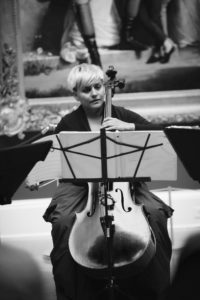Laura Cetilia
Cellist and resident musician Laura Cetilia came to Community MusicWorks in the inaugural class of fellows in 2008. She curates CMW’s experimental music series Ars Subtilior and co-directs the Sound Lab. Laura also performs avante garde music in her duo Suna No Onna and electroacoustic improvisation with husband Mark Cetilia in Mem1, which performs internationally. Their record label, Estuary Ltd., produces handmade limited edition releases. Laura recently received the Rhode Island State Council on the Arts 2017 Fellowship in Music Composition, a highly competitive grant designed to recognize and support artists doing exemplary work.
I found out about CMW in 2006. I was living in Los Angeles with my boyfriend, now my husband, freelancing as a teacher and performer. I was dismayed with how things were going. I gave private lessons and it was always privileged families that could afford to pay a teacher to come to the house. I never was able to teach kids in the communities where I was interested in teaching. There just wasn’t money to support me to do that. I was trying to get a regular concert series going in the community center in my neighborhood in Montebello, trying to collaborate with Parks and Recreation. I would call and leave messages and no one would ever call me back. It was so disheartening. That’s the hard thing about being in a big, expensive city where musicians are there to make a lot of money. The recording industry is there and most musicians had their eyes on getting great-paying recording gigs. I had no interest in that whatsoever. It was hard to find community.
I was ready for a change. Mark had been in the workforce for a number of years and decided he wanted to go to grad school at RISD. I googled “string quartet Providence” just to see if there was by chance a group that needed a cello player. The first thing that came up was Providence String Quartet and Community MusicWorks. Even better was this fellowship announcement for a string player. I started reading the website and I started to cry because I couldn’t believe that there was an organization out there doing the things that I was trying to figure out how to do on my own. I knew right then that CMW was what I should be doing.
I came for my interview and fell in love immediately. I visited Phase II (CMW’s teen leadership program) and there was this wonderful energy. It was so positive. I was impressed with how fun and open all the kids were, and it was all centered around playing chamber music. They were all kids of color. I grew up in a predominantly Mexican neighborhood. When I moved out of my neighborhood and started playing classical music I entered pretty much a white world. It was refreshing to be back in the environment where I first learned music. It felt so right to me.
CMW was everything that I hoped it would be. But I was also surprised with the struggles. We were spread out through the West End Community Center and Met School and some people taught at the office. There were a lot of space issues. There still are. But I loved teaching, loved my kids, and musically, was happy to play in any concerts I could. The same things are still satisfying to me but it’s more personal now. Ten years later, I still have all the relationships that I had back then with students and colleagues but they’re deeper.
This year is so emotional for me. Malachy and Ruby and Karl are all graduating and they were my first students. Seeing the kids grow is the biggest satisfaction. It’s beautiful how fluid the relationships can be in CMW. It’s not just about the work. Maybe because we deal with very personal things when we’re trying to figure things out musically or technically with our instruments. You tap into deeper issues and you bond quicker than you would in some other field.
The biggest challenge is not getting stuck in the day. If something goes poorly, like if we have a bad rehearsal, or if I feel I’m not getting along with someone, or if I have a student who didn’t show up for something or didn’t practice–to not get stuck in that disappointment and to keep my eye on the bigger picture. You can feel defeated pretty quickly because all of that stuff is bound to happen [laughs] at least once a week. Now that I have a family, it’s hard to not think about half of my paycheck going to paying for my daughter to be watched. You want the sacrifice to be worth it.
Then you have the other moments. One day last spring, one of my new students was really excited to have a lesson, which was great. It’s always nice to have someone walk in and want to be there. We’d been working together for eight months. Out of the blue, he said, “I love CMW.” And I said, “Oh, why?” And he said, “Because I feel like I’m part of something.” That was so amazing. It’s great when you hear that what we’re doing is working, and so quickly.
I feel lucky to be at CMW because I feel accepted for who I am and what I have to offer. I don’t feel that in any other aspect of my working life. In the orchestra, you just show up. Hopefully you’ve practiced and you can follow the conductor, and hopefully you have some friends in the orchestra that you can relate to, but that’s stretching it. My other musical interests were my dirty little secrets. I wouldn’t tell people that I played electronic music or that I had programmed a bunch of experimental music. When Sebastian asked me if I wanted to be a resident musician and said that I could run a series of concerts of music that I curated, I was shocked, in utter disbelief. It made me realize, “Wow, he really cherishes who I am and what I can give.” I’ve established more who I am artistically. Now I get to program and perform in concerts in the Ars Subtilior series, which is something that I feel really strongly about–presenting experimental music outside the classical music box.
It’s freaking hard to be a performing artist and a teacher. To be a good teacher, you need to be dedicated to your students, and to be a good performer you need to be dedicated to your instrument. CMW demands so much. Those different facets of who I am are pulled out of me. I had a hard time with this last concert. I wasn’t that excited about the repertoire and I didn’t want to sit principal. I didn’t want that responsibility and I was under-practiced and very critical of my sound but the concert turned out really well. The concert days are the bigger picture. It’s like, oh, yeah, all this work that we’re putting in, it’s not about me. It’s about the audience and the students, too, because they perform in some of the concerts. Ruby was just glowing after she heard the staff play, and that meant so much to me. So you just have to get out of your own head. The concerts do that, the performances do that. In the end, I really appreciate CMW’s investment in me. They haven’t said, “Oh, she does her weird new music thing and that’s it.” [Chuckles] A number of other people in the organization have young families and they’re trying to juggle all of this. It’s nice to know that I’m not alone. That’s how I stay motivated. I see people around me doing it too. And they’re surviving and they sound great.
I hope that if and when Sebastian leaves or retires or when Jesse leaves or retires that they’re replaced by alumni. That idea was put in my head by a program manager at Harmony Project in Los Angeles, where I worked after my fellowship ended and before I came back to CMW. We were at some parent meeting and she kind of lashed out and said, “You know, I want one of you to have this job. It should be coming from the community, not from me.” I thought that was a really amazing thing for her to say. It’s a beautiful thing to aspire to. We’re on our way there. We have lots of alumni come and work with the kids in various capacities and they’re on the board, so yeah, I can see it.
If I had to pick music that captures CMW, it would be something by John Cage because of his approach to composition. He respected the performer. He wasn’t about dictating what the performer should do every moment. A lot of his scores are very free, with guidelines, of course, but trusting the performer to make their own decisions and rely on their own judgment and, yeah, sometimes I think CMW could use more of that. It’s a very un-classical-musician way of thinking. [Chuckles] But there are definitely more elements of that kind of freedom here than in any other organization I’ve worked with.
I have a deeper understanding of the mission now because I’ve been at it for so long. And my thinking about it has improved. I still have a lot of work to do in that area just because Sebastian and Minna are so deep and thoughtful. But anyone who’s experienced CMW either as a student, or as a teacher, or as a guest musician—I think they all can leave and spread the gospel, maybe make slight changes to their lives that reflects what they had at CMW. Then we can slowly permeate into the rest of the world and not just Rhode Island.
Back to the 20 Stories homepage.


